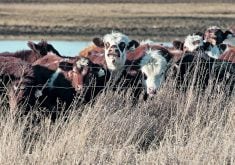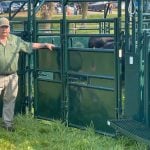Major and possibly expensive changes lie ahead for Manitoba hog producers as the result of a new road map for the industry’s future.
The Manitoba Pork Council plan released earlier this month commits the province’s 700 pork producers to eliminating sow gestation stalls within the next 15 years.
“Manitoba Pork commits to encouraging producers to phase out by 2025 the style of dry sow stalls currently used. New forms of housing must be practical and provide protection to animals and humans alike,” states a document titledEmbracing a Sustainable Future.
Read Also

Rich life took him from sky to ground
World War II veteran Burns Wood shares some memories of his time on the Alberta Sugar Beet Growers board as the organization celebrates its 100th anniversary in 2025.
It is only one of 82 commitments in a strategy aimed at making Manitoba’s hog industry more sustainable. Besides green farming practices, the plan also commits producers to new practices on animal care, odour control, food safety, and public awareness. But the commitment to gradually get rid of sow stalls is the one with the biggest potential impact on producers.
Manitoba Pork Council chairman Karl Kynoch was vague when asked how farmers will afford the transition and how the industry will enforce it, but he insisted producers have no choice but to make the change because public opinion requires it.
“We compete in a world market. Some of these things in here that consumers are demanding, we have to find a way that we can meet these and still stay competitive in the world,” Kynoch said during a March 16 news conference held to launch the strategy.
“You make a choice at the end of the day. You have to meet a lot of this stuff or you won’t survive.”
Manitoba hog producers have already experienced a host of changes to their industry, including recent provincial manure management regulations governing phosphorus levels in the soil. A University of Manitoba study concluded that complying with the phosphorus regulations will cost producers an additional $20 million a year.
Another big change for hog producers is a total ban on spreading manure on fields in winter in 2013. The ban already covers large operations above 300 animal units. Now small operations will have to comply, too.
The pork council’s plan commits producers to ending winter spreading but “within a reasonable time frame,” suggesting the 2013 deadline is not achievable.
———
“Youmakeachoiceattheendoftheday.Youhavetomeetalotofthisstufforyouwon’tsurvive.”
KARL KYNOCH
Manitoba Pork Council














